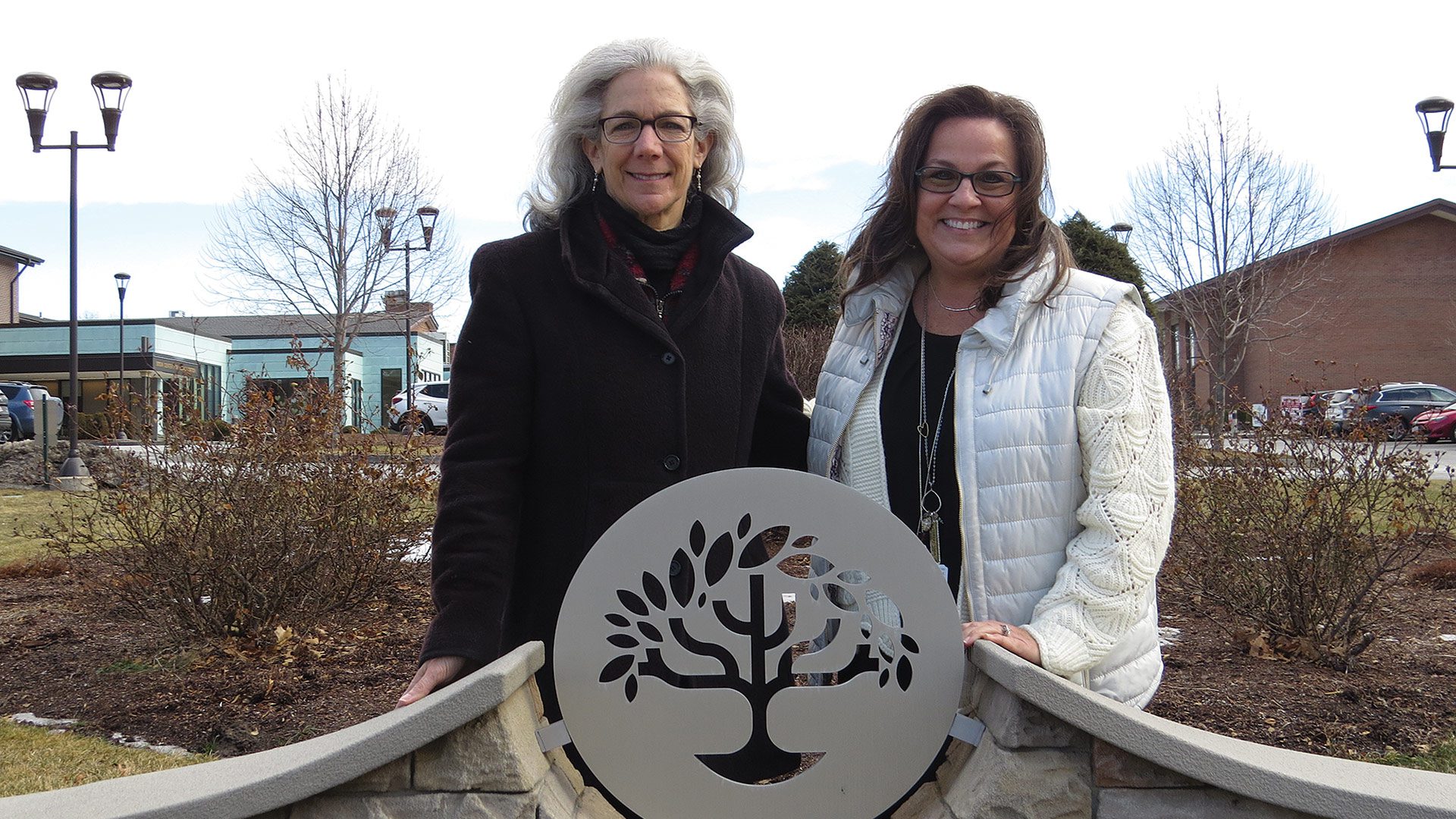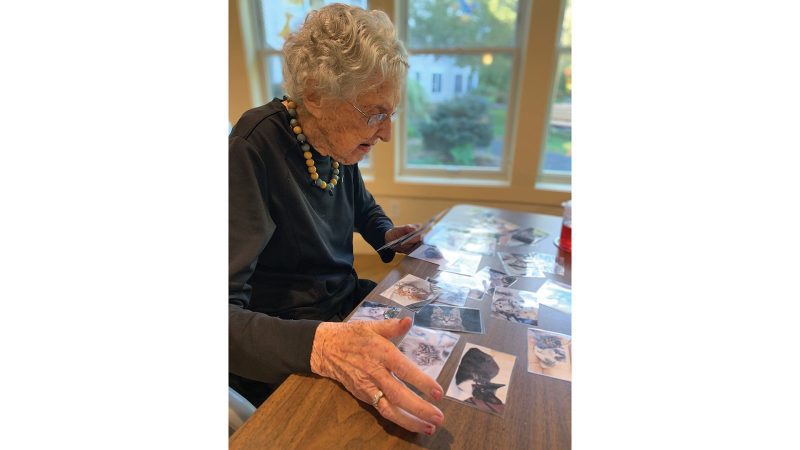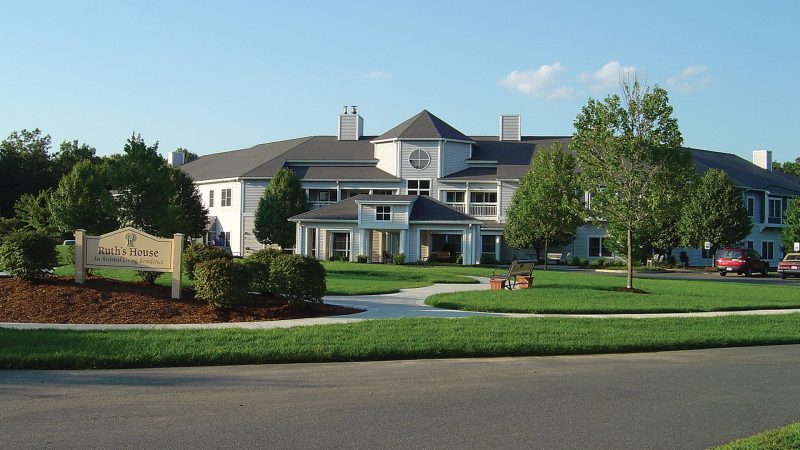JGS Lifecare Incorporates Memory Care into Entire Continuum of Services
Peace of Mind
By Joseph Bednar
The connection between music and memory is a complex and often surprising one. Just ask the families of loved ones with dementia at Ruth’s House, the assisted-living residence on the JGS Lifecare campus in Longmeadow.
“We ask, ‘what sort of music did your loved one enjoy?’ Then we have volunteers come in and build personal playlists,” said Susan Halpern, vice president of Development and Communications at JGS. “It’s amazing to see the reactions — to see someone who’s agitated get less agitated, or someone who had been very quiet come out of their shell because they’re hearing something that’s very familiar to them.”
Mary-Anne Schelb, director of Business Development, has also seen the results of what JGS calls its music and memory program.
“Maybe they’re not much of a talker, and suddenly they’re singing this song. It’s hard to carry on a conversation with them, but when the music comes on, they remember every word. The artistic and creative ability is really the last to go. It’s in there — we just need to know how to pull it out.”
Or, as Halpern put it, “it’s about meeting them where they are.” That’s why residents’ families fill out a long (around eight pages) resident profile upon admission, Schelb added.
We really want to get to know your mom or dad, and we want to know what they like and don’t like, because then we utilize that.”
“If they can’t stand bingo, we’re not going to try to push bingo. Or if they love hot-air balloons, we can go up to them and ask, ‘hey, do you know we’re showing a hot-air-balloon movie in the movie room?’ You see their face light up — ‘you are? I love hot-air balloons.’ The profile is time-consuming, but we really want to get to know your mom or dad, and we want to know what they like and don’t like, because then we utilize that.”
Meeting residents where they are is especially important for those with early- to mid-stage memory impairments and other dementia-related diseases who live in the Garden at Ruth’s House, a separate, secure neighborhood that caters to individuals with increased cognitive and physical limitations, including Alzheimer’s and dementia, and where staff members are specifically trained to care for individuals in need of memory care.
But what some might not know, Schelb said, is that JGS has, over the years, incorporated specific memory-care training across its contimuum of services, from Spectrum Home Health & Hospice Care to Wernick Adult Day Health Care; from the Leavitt Family Jewish Home to the Sosin Center for Rehabilitation.
Why? Because the memory-care population is on the rise as Americans live longer than ever — and early-onset dementia in younger people is ticking up as well. So the model JGS has adopted, of making sure all the points along its continuum of services can handle different levels of dementia, is one increasingly taking hold in the world of senior living and care.

“We were the ones who spearheaded dementia-friendly Longmeadow a few years ago, which was really important to us, to make people aware of the differences of folks that have this higher level of memory loss, because people really didn’t know how to deal with them. They didn’t know what to do, how to act,” Schelb explained. “We wanted to make people aware, so I worked with the senior center, some emergency responders, and we worked with the Alzheimer’s Association and got certified as a dementia-friendly town.”
Similarly, making JGS a dementia-friendly campus was a natural evolution, she noted. “Except for Genesis independent living, every single piece of the campus concentrates on memory care.”
Gardening Tools
The Garden gives Ruth’s House an element of security and higher-level care for individuals with dementia, Schelb explained.
“Maybe you start out in traditional assisted living, and as they progress [with memory loss], we could add services to the apartment as long as they’re not a wander risk, and if they do become a wander risk, we’ve got the secure Garden level, which is beautiful inside and out,” she said, noting the waterfall, scenic walkways, and benches out back; the fact that the area is safely fenced in is obscured by the landscaping.
“We just wanted to make it this gorgeous, park-like environment. A lot of people like to walk, and and here they can be outside, and it gives them that sense of freedom.”
In the Leavitt skilled-nursing facility, two nursing neighborhoods are dedicated to caring for people with memory impairments, Halpern explained, while staff of the other JGS programs, like Wernick and Sosin, are trained in working with people with memory loss as well.
We’re a person-centered campus, and we deal with memory impairment across our entire campus the same way. You take the approach that you’re meeting the person where they are.”
“As a campus, we’re caring for elders, and it sort of goes hand in hand that, as people get older, they’re suffering memory loss,” she told HCN. “So we take the care of people with dementia, memory loss, and Alzheimer’s disease as a central care delivery that we train our staff on during orientation.”
That orientation, when staff are taught how to engage with people with dementia, is followed by annual reviews and specific skills-training events during the year, she added, noting that JGS will be using grant funds to expand that skills training.
“We’re a person-centered campus, and we deal with memory impairment across our entire campus the same way,” Halpern added. “You take the approach that you’re meeting the person where they are.”
Added Schelb, “we’re finding a lot more people suffering from memory loss at earlier ages. Early-onset dementia and Alzheimer’s is something very real that a lot of people are experiencing, so we need to pivot and shift to make sure we can care for our folks here on the campus in any way, shape, or form.
“We’ve even got our home health dealing with folks with memory loss, or even end-stage Alzheimer’s in hospice,” she went on. “Unfortunately, we have seen more of it, across the board; I think healthcare in general has seen a lot more. And we want to be able to give our residents as fulfilled a life as possible.”
Many times, Halpern said, a senior-living facility is one of the first places family members contact when they suspect a memory issue.
“People reach out to us when they need help. And when do families need help? Often, it’s when they have a loved one who’s suffering from dementia and memory impairment, and they’ve tried to work with them at home. So we’ll work with them at home with our Spectrum Home Health Care, but then it can get to a point where you just can’t handle it. Maybe it’s the incontinence, maybe it’s the wandering and the risk of that, but we find that families are reaching out to us when they’re willing to give up their loved one. And it is a tough decision to place your loved one in a care setting.”

Even people with dementia who are able to live at home with family members can benefit from Wernick’s day programs, Halpern added.
“We were one of the first adult day health centers in Western Mass., back in the ’70s. We get a lot of people needing adult day care who have memory impairment and forgetfulness, and they are benefiting from being in social settings — and we offer social settings, be it in adult day care or assisted living, that helps people not feel isolated, and we help give them experiences that are failure-free.”
High-tech, Human Touch
Some of those experiences at Ruth’s House take place in a sensory room that allows residents to have experiences that reduce agitation and frustration, especially late in the day, a phenomenon known as sundowning.
“Some don’t want to be touched, or don’t like bright lights or loud sounds. They react differently to activities,” Schelb said, explaining that the sensory room is softly lit, soothing music often plays, and the room incorporates tactile technology, on touchscreens and activity panels, that stimulates in a calmer way.
“We downplay the aggravation for them. We teach staff how to recognize it and what to do, and it’s part of their care plan. We know what activities they like. And any new technology they have out there, we try to get and incorporate into our care plans and train staff to utilize them properly.”
Beyond its own programs, Ruth’s House works with families on their own communication, Schelb said.
“Sometimes we find families don’t know how to interact with their loved ones, causing frustrations. There’s a level of resentment because it really engulfs their whole life. We say, ‘let us help you; let us be the caregiver, and you go back to being the son or daughter or husband or wife.’ It’s really hard to do both.”
By focusing on the relationship and not the caregiving, families learn to move past the frustrations of life with Alzheimer’s or dementia, especially during the early stages when they’re just getting acclimated to the situation.
“They can get upset with mom or dad: ‘I just told you that; how do you not remember that?’ But they’re not purposefully forgetting; this is just part of the disease,” Schelb said, so family education and support groups are crucial — as is understanding when it’s time to seek the appropriate level of help. “Sometimes they can stay at home, and we can help. But sometimes they realize it’s just too much, and they realize they have options on our campus.”
It’s a campus that embraces not only person-centered care, Halpern said, but — at least in the Sosin Center — the ‘green house’ model of small-house care, which focuses on three goals: an authentic, home-like setting; meaningful life; and empowered staff.
“We recognize the environment is important to peoples’ well-being and how they feel,” she noted, adding that a second phase of what’s been called Project Transformation will bring the green-house model of renovations to the Leavitt Jewish Family Home as well — arguably a more important site for it, since it’s a long-term facility where residents will live the rest of their lives.
In short, Halpern said, JGS continues to look at ways to meet residents where they are.
“That affects how we care for people with dementia as well,” she added. “It’s part of our philosophy.”



